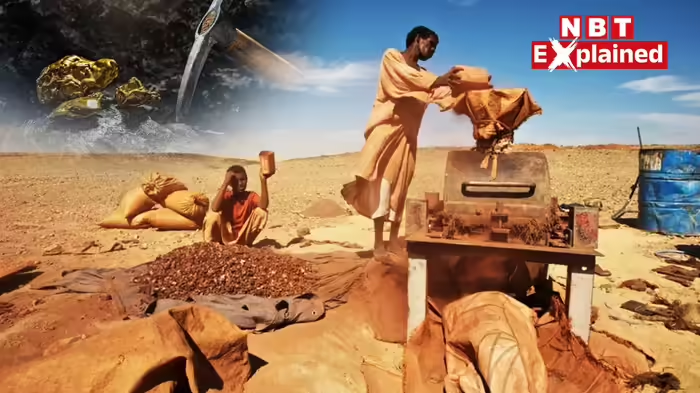
New Delhi / Khartoum:
Sudan, a nation once thriving on its oil wealth, has now been consumed by a bloody gold rush that has redrawn the country’s political and economic map — and pulled in a host of foreign powers. What began as a domestic struggle over dwindling oil revenues after 2011 has exploded into a full-scale resource war, with gold at its core and the world’s biggest players — from the UAE and Egypt to Russia and China — jostling for control.
Once Africa’s third-largest gold producer, after Ghana and South Africa, Sudan’s goldfields have become both a lifeline and a curse. The lucrative metal now finances warring factions, arms deals, and international smuggling networks. But for the country’s poor miners and farmers, it has brought nothing but death and destruction — poisoning water, eroding farmland, and fueling an unending civil war.
Toxic Gold: How Sudan’s Mining Devastated the Nile
A report by Yale Environment 360 revealed that Sudan’s small-scale miners use mercury and cyanide to process gold, exposing themselves and their families to lethal contamination. Toxic runoff has seeped into groundwater and, after the floods of 2022, even reached the Nile River, Sudan’s most vital water source.
Sudanese researcher Mohammed Abdelrahman of the Pantheon-Sorbonne University in Paris warned that these chemicals are threatening the survival of entire communities.
Foreign Powers and the Battle for Sudan’s Gold
Neighboring countries — including Egypt, the UAE, Chad, and Eritrea — have deep commercial interests in Sudan’s gold trade.
Most artisanally mined gold finds its way to the United Arab Emirates, while Russia and China have aggressively expanded into large-scale industrial mining. Analysts believe Russia uses its gold concessions to fund arms purchases and circumvent sanctions.
According to the Italian Institute for International Political Studies (ISPI), gold became a strategic tool of war after the 2023 civil conflict erupted. With Sudan losing 75% of its oil reserves and 90% of foreign currency income following South Sudan’s secession in 2011, the regime of Omar al-Bashir turned to gold to fill the void — granting mining rights to military-linked firms and foreign investors.
From Gold Discovery to Coup d’État
A major gold find in Jebel Amer (North Darfur) in 2012 transformed Sudan’s economic fate. Gold exports soon accounted for 60% of the country’s total exports, and Khartoum opened the Sudan Gold Refinery under central bank control to monopolize trade.
But by 2017, most mines had fallen into the hands of Mohamed Hamdan Dagalo (Hemetti) and his powerful Rapid Support Forces (RSF).
Increased taxation on gold miners led to protests, weakening Bashir’s rule and contributing to his ouster in 2019. The following years saw military coups, power struggles, and foreign interventions, with gold as the common denominator.
UAE Emerges as Sudan’s Top Gold Buyer
By 2024, the RSF controlled both Jebel Amer and the Sudan Gold Refinery in Khartoum — holding an estimated 10 tons of gold worth $860 million.
A UN panel reported that much of Sudan’s gold is smuggled to Dubai, where it enters the global market under legal cover. The UAE has become the largest buyer of Sudanese gold, despite accusations that its trade indirectly fuels the RSF’s war efforts.
Meanwhile, Egypt has also emerged as a competing hub for smuggled gold, especially from Nile and Red Sea regions — a move seen as part of Cairo’s effort to counterbalance the UAE’s growing influence.
Russia’s Strategic Interest and the Shadow of a Coup
In April 2024, a Russian delegation to Port Sudan secured a massive exploration concession and a bilateral deal allowing trade in rubles, enabling Sudan to buy Russian arms directly.
Experts believe Moscow had backed Sudan’s 2021 coup to safeguard these interests and prevent any anti-corruption reforms from jeopardizing its gold-linked operations.
A Nation Buried Beneath Its Own Wealth
Sudan’s tragedy lies in its paradox — a country rich in natural resources but crippled by greed, corruption, and foreign exploitation. As foreign powers dig deeper into its soil, Sudan bleeds — its rivers poisoned, its people starving, and its sovereignty auctioned off for gold.
Discover more from SD NEWS agency
Subscribe to get the latest posts sent to your email.
